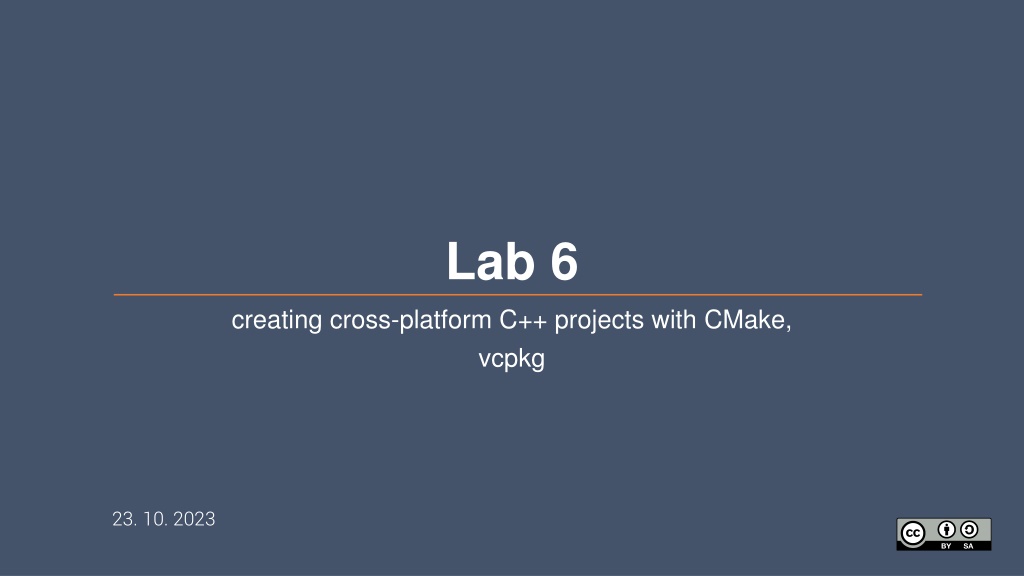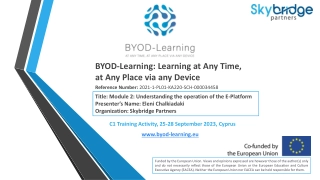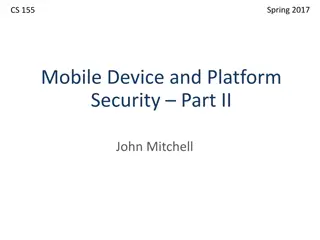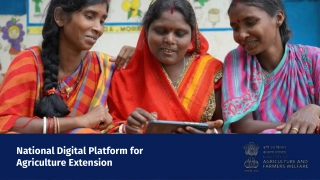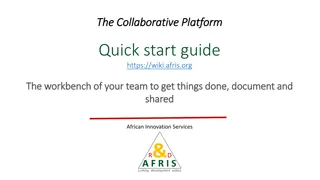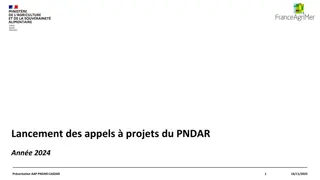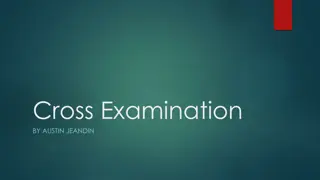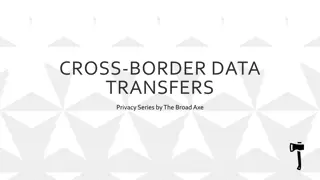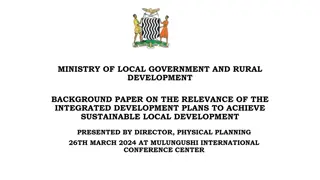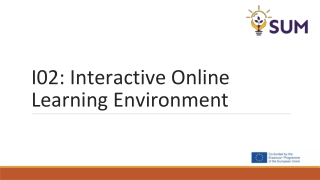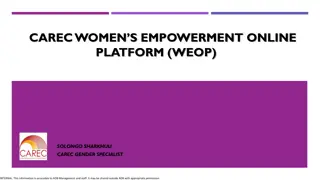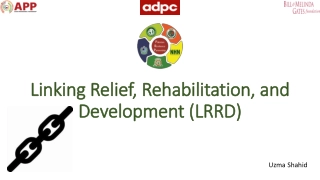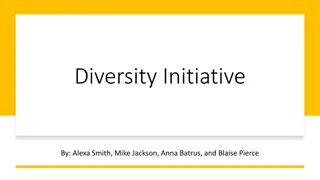Cross-platform C++ Development with CMake and vcpkg
Explore the process of creating cross-platform C++ projects using CMake and vcpkg. Learn about the motivation behind build and meta-build systems, the usage of CMake for project configuration, the significance of cross-platform dependency managers like vcpkg, and how to integrate CMake with vcpkg for managing project dependencies effectively. Utilize helper codes from a public GitLab directory to enhance your understanding and implementation of C++ programming concepts, including polymorphism and dynamic dispatch.
Download Presentation
Please find below an Image/Link to download the presentation.
The content on the website is provided AS IS for your information and personal use only. It may not be sold, licensed, or shared on other websites without obtaining consent from the author. Download presentation by click this link. If you encounter any issues during the download, it is possible that the publisher has removed the file from their server.
Presentation Transcript
Lab 6 creating cross-platform C++ projects with CMake, vcpkg 23. 10. 2023
Outline 1. Motivation to build and meta-build systems 2. CMake 3. Motivation for cross-platform dependency managers 4. vcpkg 5. Using CMake with vcpkg to have a project with dependencies 2023/2024 2 Programming in C++ (labs)
The helper codes are in public gitlab Directory `lab_06`: https://gitlab.mff.cuni.cz/teaching/nprg041/mejzlik/labs-cpp-pub Use this as a starting points and resources for this lab and Task 06 2023/2024 3 Programming in C++ (labs)
Reminder: Copying containers with polymorphic types Create abstract method `clone` on the base class Each derived class must implement the clone method It is virtual and will call the correct implementation This way, we avoid slicing Iterate over the items and call the clone method class AbstractVal { public: virtual void print() = 0; virtual Valptr clone() = 0; }; Dynamic dispatch by the type of x IV AV x IV ... operator=(const GenVector& s) { for( auto&& x : s._data) _data.push_back( x->clone()); return *this; } class IntVal : public AbstractVal { .... virtual Valptr clone() override { return make_unique<IntVal>(*this); } }; AV x We construct the correct instance *this if of type IntVal 2023/2024 2023/2024 5 5 Programming in C++ (labs) Programming in C++ (labs)
Using typeid is generally a bad practice This code will need to be edited if more types of animals will be added It uses typeid result to do the "dynamic displatch" Let the compiler do the dynamic dispatch for you using virtual functions Zoo(const Zoo& other) { for (auto& [_, animal] : other._animals) { std::unique_ptr<Animal> a; if (typeid(*animal) == typeid(Dog)) { a = std::make_unique<Dog>(*animal); this->insert(std::move(a)); } else if (typeid(*animal) == typeid(Cat)) { a = std::make_unique<Cat>(*animal); this->insert(std::move(a)); } else if (typeid(*animal) == typeid(Fly)) { a = std::make_unique<Dog>(*animal); this->insert(std::move(a)); } } this->_restock = other._restock; } Zoo(const Zoo& zoo) { for (const auto& [k, p_a] : zoo._animals) { insert( (*p_a).clone() ); } _food = zoo._food; } vs 2023/2024 2023/2024 6 6 Programming in C++ (labs) Programming in C++ (labs)
Lab 05 notes GOOD: Using CMake already! !GOOD Using typeid/dynamic cast for something polymorphism should do By calling a virtual function on a polymorphic pointer Still generated files in the repositories! 2023/2024 7 Programming in C++ (labs)
Why you should use build systems make ninja SCons Manual compilation is just not realistic with the real- world application Too many flags, include dirs, link libs You would spend your whole life writing `g++` command g++ -std=c++20 -O3 -g -Wall -Wextra -Werror -Wshadow -pedantic \ -Iinclude -Isrc -I/usr/local/include -Ithird_party/libA/include \ -Ithird_party/libB/include -DDEBUG -DUSE_SPECIAL_LIB \ -L/usr/local/lib -Lthird_party/libA/lib -Lthird_party/libB/lib \ -lmylibrary -lthird_party_libA -lthird_party_libB -lm -lpthread \ -o myapp \ src/main.cpp src/util.cpp src/logic.cpp src/algorithm.cpp src/interface.cpp \ src/networking.cpp src/database.cpp src/compatibility.cpp src/legacy.cpp \ src/new_feature.cpp src/security.cpp src/performance_optimization.cpp \ src/third_party_integration.cpp \ -MMD -MP -MF build/dependencies.d \ -fdiagnostics-color=always -fPIC -fstack-protector-strong \ -fsanitize=address -fsanitize=undefined -flto Automation & less errors Saves time Consistency The build behaves the same for your colleagues Dependency management Real-world projects use many third-party libraries Incremental build Do not re-compile what is not necessary Distribution of your code 2023/2024 9 Programming in C++ (labs)
Why you should use meta build systems CMake Premake GYP Meta-build system It generates a temporary project in a build system of choice Usually to ./build directory, you can delete that and generate a new one It contains only references to the actual source files It makes your project cross-platform E.g. make works fine across Linux platforms On Windows, it's not that great We're going to use CMake You have a CMake project and when you want to work on it you can generate temporary project for your favourite build system Make Visual Studio solution Ninja 2023/2024 10 Programming in C++ (labs)
Other solutions? Docker Podman Nowadays, it is also popular to deliver containers A container is a "lightweight virtual machine" Usually, you can use containers in two ways NSWI150 - Virtualizace a cloud computing As a build environment You build the project and then the binary is used on the host system The host system must be compatible with the final binary Must also have all required dynamic libraries As a build & runtime environment You build and run the program inside the containers All build and runtime dependencies are installed inside the container 2023/2024 11 Programming in C++ (labs)
CMake is a meta build system vcpkg conan Cross-platform build system generator Widely used with C++ projects Target version 3.0, referred to as "Modern CMake" Shift from "define flags and directories globally" to "define per targets" You specify "things" for each target without affecting the other targets Configured per-folder by CMakeLists.txt Can generate projects in many build systems make ninja Visual Studio 2023/2024 13 Programming in C++ (labs)
Old vs modern CMake cmake_minimum_required(VERSION 2.8) project(OldStyleProject) cmake_minimum_required(VERSION 3.0) project(ModernStyleProject) # Global include directories for all targets include_directories(include/) # Executable target add_executable(new_app main.cpp) # Global compiler flags add_definitions(-DDEPRECATED_FLAG) # Specify include directories for this specific target target_include_directories(new_app PRIVATE include/) # Executable target add_executable(old_app main.cpp) # Use target_compile_definitions for target-specific flags target_compile_definitions(new_app PRIVATE -DUSE_MODERN_CMAKE) # Linking the libraries globally link_libraries(libA libB) # Use target_link_libraries for target-specific linking target_link_libraries(new_app PRIVATE libA libB) 2023/2024 14 Programming in C++ (labs)
Using CMake cmake_minimum_required(VERSION 3.20) project(lab_06) Min version of cmake requried Name of the project, reference as ${PROJECT_NAME} # Set the C++ standard set(CMAKE_CXX_STANDARD 20) set(CMAKE_CXX_STANDARD_REQUIRED ON) Again, variable but this one is configurable from the outside using -D MY_CACHE_VARIABLE=hello Define variable and set its value # Find required packages find_package(SFML COMPONENTS graphics REQUIRED) find_package(Boost COMPONENTS system REQUIRED) Find dependency library installed in the system # Variables set(MY_CACHE_VARIABLE "DEF VALUE" CACHE STRING "Description of the variable.") option(TESTING "This is settable from the command line" OFF) # ... Variable but only Boolean - ON/OFF | 1/0 | TRUE/FALSE 2023/2024 15 Programming in C++ (labs)
Using CMake Target name, use this for target_* commands # ... # Add executable add_executable(${PROJECT_NAME} main.cpp) Define that executable will be produced from the given list of source files (not headers) # Include dirs target_include_directories(${PROJECT_NAME} PRIVATE include/) Include directories for this target, like -I in GCC # Use target_compile_definitions for target-specific flags target_compile_definitions(${PROJECT_NAME} PRIVATE -D OUR_FLAG) preprocessor defs that will be provided during compilation like #define OUR_FLAG # Link libraries target_link_libraries(${PROJECT_NAME} PRIVATE sfml-graphics Boost::system) # Include also other directories recursively add_subdirectory(core) Link this target with these libraries, like -l in GCC # If statement if(TESTING) add_subdirectory(tests) endif() Recursively process this directory (must contain CMakeLists.txt) If statement, true if TRUE, 1, ON 2023/2024 16 Programming in C++ (labs)
3) Motivation for cross-platform dependency managers
There is no unified package manager across systems On Linux, you usually can get away with system package managers apt, yum, dnf, pkgconfig On Windows, there is no such thing The solution is to use cross-platform package managers vcpkg https://vcpkg.io/en/ available for Windows, Linux, and Mac, open-source by Microsoft conan https://conan.io/ roughly the same, but from jFrog 2023/2024 18 Programming in C++ (labs)
vcpkg is cross-platform dependency manager for C++ https://vcpkg.io/en/getting-started List of many open-source libraries for C++ curated by Microsoft Libs are downloaded and locally compiled but are not installed outside of the vcpkg directory git clone https://github.com/Microsoft/vcpkg.git cd vcpkg .\bootstrap-vcpkg.bat vcpkg install sfml:x64-windows boost-asio:x64-windows 2023/2024 20 Programming in C++ (labs)
5) CMake + vcpkg = ?? Nah, more like CMake + vckpg != total hell if you want to have your project working on both Windows and Linux
Putting it all together In CMake, find_package looks for dependencies in your system Or in paths explicitly provided by toolchain files mkdir build cd build cmake .. -G "Visual Studio 17 2022" -A x64 \ -DCMAKE_TOOLCHAIN_FILE=~/source/repos/vcpkg/scripts/buildsystems/vcpkg.cmake cmake --build . 2023/2024 22 Programming in C++ (labs)
Today's lab is like an example how you can start your semestral project Do not forget that I need to accept your topic until 17. 11. 2023 This is how you can start any C++ project with some dependencies This is not the only way to do things, this is only one of the possibilities Feel free to try different approaches and tools I am going to demonstrate how to bootstrap a cross-platform C++ project Using vcpkg for dependency management Using CMake as a meta-build system 2023/2024 24 Programming in C++ (labs)
Task 6 Put together a cross-platform CMake project that uses boost.asio https://www.boost.org/doc/libs/1_76_0/doc/html/boost_asio.html SFML https://www.sfml-dev.org/ Make sure that the project is simply buildable on Windows and Linux systems It means that after installing the required dependencies somehow (system package manager, vcpkg) I will be able to build the project The project shall build two executables: server (UDP) listening at port 8000 for rendering commands and drawing them inside the window draw rectangle 1 1 2 2 (bottom left corner -> top right corner) draw line 2 2 -1 -1 (start point -> end point) client (UDP) when invoked, it shall send the provided ASCII text as UDP datagram to the server at localhost:8000 2023/2024 25 Programming in C++ (labs)
Work plan 1. 2. 3. 4. 5. 6. 7. 8. Install vcpkg & install boost-asio and SFML for x64 windows Install CMake Create skeleton source codes with CMakeLists.txt files Fill in the CMakeLists.txt files so we can compile Generate project (for Visual Studio) Use ASIO for UDP client and server Use SFML to draw 2D graphics Combine the two to fulfill the Task 6 2023/2024 26 Programming in C++ (labs)
1) Installing vcpkg and required dependencies git clone https://github.com/Microsoft/vcpkg.git cd vcpkg .\bootstrap-vcpkg.bat vcpkg install sfml:x64-windows boost-asio:x64-windows Total install time: 5.1 min The package boost is compatible with built-in CMake targets: find_package(Boost REQUIRED [COMPONENTS <libs>...]) target_link_libraries(main PRIVATE Boost::boost Boost::<lib1> Boost::<lib2> ...) The package sfml provides CMake targets: find_package(SFML COMPONENTS system window graphics CONFIG REQUIRED) target_link_libraries(main PRIVATE sfml-system sfml-network sfml-graphics sfml-window) # If you want SFML to provide an implementation of main(): target_link_libraries(main PRIVATE sfml-main) -DCMAKE_TOOLCHAIN_FILE=~/source/repos/vcpkg/scripts/buildsystems/vcpkg.cmake 2023/2024 27 Programming in C++ (labs)
2) Install CMake On Linux, use your favourite package manager e.g. apt install cmake On Windows, use winget in e.g. PowerShell run as administrator winget install --id=Kitware.CMake Or use download and install manually https://cmake.org/download/ > cmake --version cmake version 3.27.7 2023/2024 28 Programming in C++ (labs)
3) Create project skeleton Let's keep it simple, we can add more later |- client | |- client.cpp | |- CMakeLists.txt |- server | | - server.cpp | | - CMakeLists.txt | |- README.md |- CMakeLists.txt #include <iostream> int main(int argc, char** argv) { std::cout << "Hello, I am a UDP client!" << std::endl; return 0; } #include <iostream> int main(int argc, char** argv) { std::cout << "Hello, I am a UDP server!" << std::endl; return 0; } 2023/2024 29 Programming in C++ (labs)
4) Write CMakeLists.txt files cmake_minimum_required(VERSION 3.20) project(lab_06) set(CMAKE_CXX_STANDARD 20) set(CMAKE_CXX_STANDARD_REQUIRED ON) the directory client/ set(SERVER_EXE "server" CACHE STRING "Name of the server executable.") set(CLIENT_EXE "client" CACHE STRING "Name of the client executable.") # Find required packages find_package(Boost COMPONENTS system REQUIRED) # Include also other directories recursively add_subdirectory(server) add_subdirectory(client) # Add executable add_executable(${CLIENT_EXE} client.cpp) Root file # Include dirs target_include_directories(${CLIENT_EXE} PRIVATE .) # Link libraries target_link_libraries(${CLIENT_EXE} PRIVATE Boost::system) the directory server/ # Find required packages find_package(SFML COMPONENTS system window graphics CONFIG REQUIRED) find_package(Boost COMPONENTS system REQUIRED) # Add executable add_executable(${SERVER_EXE} server.cpp) # Include dirs target_include_directories(${SERVER_EXE} PRIVATE .) # Link libraries target_link_libraries(${SERVER_EXE} PRIVATE sfml-system sfml-network sfml-graphics sfml-window) target_link_libraries(${SERVER_EXE} PRIVATE Boost::system) 2023/2024 30 Programming in C++ (labs)
5) Generate the project mkdir build cd build cmake .. -G "Visual Studio 17 2022" -DCMAKE_TOOLCHAIN_FILE=~/source/repos/vcpkg/scripts/buildsystems/vcpkg.cmake cmake --build . Now you can open the solution in Visual Studio The `build` folder can be deleted anytime and re-generated All settings are in the CMakeFiles.txt files 01_skeleton/ 2023/2024 31 Programming in C++ (labs)
6) Write the client and the server with ASIO CLIENT https://www.boost.org/doc/libs/1_83_0/doc/html/boost_asio/tutorial/tutdaytime4.html Send ASCII symbols as UDP message to 127.0.0.1:8000 SERVER https://www.boost.org/doc/libs/1_83_0/doc/html/boost_asio/tutorial/tutdaytime5.html Listens for UDP datagrams at 127.0.0.1:8000 and prints the message into the STDOUT. 02_client_server/ 2023/2024 32 Programming in C++ (labs)
7) Use SFML to draw shapes into a window SERVER Comment out the network stuff for now, goal is to get SFML working and drawing https://www.sfml-dev.org/tutorials/2.6/graphics-draw.php Draw a few shapes into the windows https://www.sfml-dev.org/tutorials/2.6/graphics-shape.php Circle Rectangle Line 03_sfml_draw/ 2023/2024 33 Programming in C++ (labs)
8) Put it all together SERVER Renders shapes based on the incoming commands from the network CLIENT No changes required 04_network_render/ This is up to you! 2023/2024 34 Programming in C++ (labs)
Lab 6 wrap up You should know how to wrap a C++ project into CMake to make it cross-platform how to add dependencies to the CMake project how to install dependencies with vcpkg and use it with CMake basic usage of SFML & boost.asio Next lab: STD containers and iterators Your tasks until the next lab: Task 6 (24h before, so I can give feedback). Now please submit nice CMake project! You also need to accept the topic of term project with me by 17. 11. 2023 2023/2024 36 Programming in C++ (labs)
